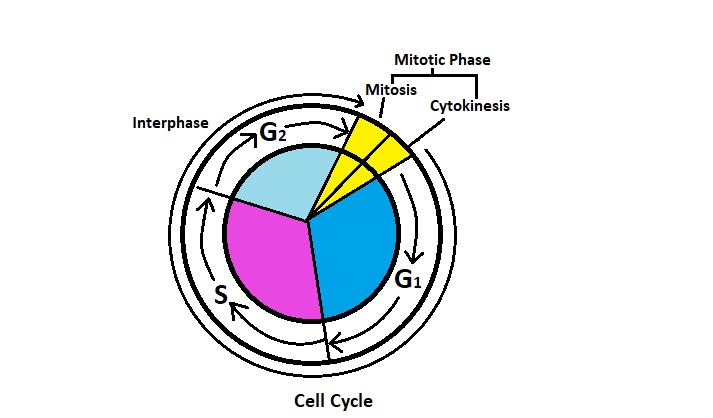Definition of the Cell Cycle:
The cell cycle includes all the steps involved in cell growth, DNA replication, and division into two genetically identical daughter cells. It encompasses the stages through which a cell progresses, ensuring proper growth and maintenance of living organisms.
Phases of the Cell Cycle:

Interphase:
G1 Phase (Gap 1): The cell expands and continues its normal operations. It prepares for DNA replication by synthesizing proteins and accumulating energy.
S Phase (Synthesis): DNA replication occurs, resulting in the duplication of the cell's genetic material. Each chromosome forms a sister chromatid, connected at the centromere.
G2 Phase (Gap 2): The cell continues to grow, synthesizes proteins, and prepares for cell division. It checks DNA for errors, repairs any damage, and ensures proper replication.
Mitotic Phase (M Phase):
Mitosis: The cell's nucleus undergoes division, making sure each daughter cell inherits an identical set of chromosomes.
Prophase: Chromosomes condense, becoming visible structures. The nuclear envelope disintegrates, and spindle fibers start to develop.
Metaphase: Chromosomes align along the equatorial plane (metaphase plate) of the cell.
Anaphase: Spindle fibers pull sister chromatids apart, guiding them to opposite ends of the cell.
Telophase: Chromosomes arrive at the poles. New nuclear envelopes form around each group of chromosomes, and the spindle fibers break down. Chromosomes begin to decondense.
Cytokinesis: The division of the cytoplasm and organelles to form two daughter cells.
In animal cells: A cleavage furrow develops and deepens until the cell splits into two distinct cells.
In plant cells: A cell plate made up of vesicles carrying cell wall materials forms at the center of the cell. The cell plate gradually develops into a new cell wall that separates the daughter cells.